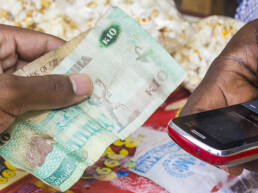"Poverty is the absence of human rights."
“Poverty is the absence of all human rights”1, said Muhammad Yunus, the man who lifted more than 7 million families out of poverty2 through his revolutionary microcredit system, and laureate of the Peace Nobel Prize. His groundbreaking program demonstrated the power of financial access to reduce inequalities and boost prosperity.
Globally, 1.7 billion adults are unbanked or unserved worldwide. In the U.S., they represent 25% of households, a staggering 50 million people. It can be explained by many and varied reasons but one in particular stands out: the lack of access. Lack of physical access (people living in a rural area with poor infrastructure and no access to technology), social access (gender discrimination), legal access (people without birth certificate or identity document), lack of understanding and knowledge or just the lack of income. Indeed, traditional financial institutions won’t open an account for low-income individuals. The opportunity cost (i.e. their infrastructure cost to open and maintain an account is higher than the dividends earned by investing the money deposited on said account) and risk of not repaying loans are too high.
Closer to home, the current pandemic reminds us the importance of access to personal emergency funds to face employment shocks and unexpected health expenses. The economy has slowed down or even stopped. The activity of many businesses — independently of their size — is on hold. Many restaurants, barbers, shopping centers, plants or even airlines risk going bankrupt. In just a few weeks, almost 40 million people filed for unemployment benefits. Among them, many live paycheck to paycheck, with no savings, relying on stimulus checks to survive3.
This situation of distress could be avoided or at least mitigated with simple measures. Two measures in particular stand out. The first one is the implementation of a universal basic income like the model proposed by Andrew Yang, the candidate in the 2020 Democratic presidential primaries. The second one is universal and unconditional access to financial services such as a bank account, a savings account, and credit. While the implementation and cost of universal income is subject to debate, its inherent concept and universal financial access for all seem to be ideals to strive towards.
In modern capitalist society, where money acts as an equalizer, financial access has the power to ensure that an individual can access other entitlements. But the lack of it creates a yawning gap between the wealthiest and people at the bottom of the pyramid whose default lifestyle is often survival.
In 2010, the Associated Press reporter Candice Choi, made the experiment of living as what she calls a “financial nomad” in New York City for a month4. She put away her credit and debit cards and stopped direct deposit in lieu of paper paychecks. During that month, she experienced the hassle and wasted time of cashing her paper paycheck as well as the high fees of so-called alternative financial tools. Candice paid roughly 3% in fees during her one-month experience as financial nomad. And she made only routine transactions, she didn’t need a payday loan (whose annual percentage rate is outrageous) or to buy a car. In their book Financial Inclusion at the Bottom of the Pyramid, Carol Realini and Karl Mehta talk about alternative financial services in those words: “If cash is king, then its partner, the queen, [alternative financial services], can be either benign or evil”. While they fits the needs of the unserved, they can also be their worst enemy. “If you don’t pay on time, [they] can be a threat to your life”.
In light of those alarming facts, important questions arise. Why do private organizations have to step up and alternative financial services have to be created to compensate for the system failure? Why can’t many governments reform traditional financial institutions, spur financial inclusive growth and give dignity back to their poorest?
While the Universal Declaration Of Human Rights adopted by the United Nations in 1948 constitutes access “to standard of living adequate for the health and well-being of himself and of his family, including food, clothing, housing and medical care”5 as basic human rights, it does not cover the elementary right to access financial instruments necessary to enjoy basic needs. This right is, first and foremost, a right against financial exclusion, a right to “human decency”6, as Ajay Banga, former CEO of Mastercard and one of the most fervent advocates for financial inclusion puts it. It is a necessary condition for breaking cycles of poverty. In their universal agenda for sustainable development, the United Nations have identified financial inclusion as a key catalyst enabler of at least six out of the seventeen goals7. Goals as important as poverty eradication, access to clean water and energy, gender equality, or access to a quality education. If financial inclusion is so crucial for the sustainability of our planet and its global population, then it must universally be recognized as a human right. The state nations should have the responsibility to ensure with their laws and policies that no discrimination, physical, or legal barrier is in the way of financial access and prevents people from making a better life for themselves.
